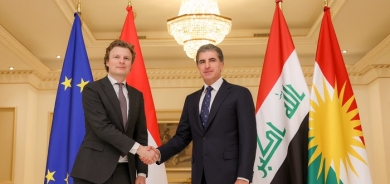Iran's Water Blockade Threatens Kurdistan Region's Agriculture

In a developing crisis, Iran has completely halted the flow of water from the Little Zab River into the Kurdistan region for over two weeks, leading to dire consequences for the region's agricultural sector and water resources. This situation has severely impacted the Dokan Dam reservoir in the Sulaymaniyah Governorate, raising concerns among farmers who now face significant losses and the possibility of having to abandon their lands.
The Little Zab River, originating in northwestern Iran, stretches across 402 kilometers within Iraq, passing through Sulaymaniyah and onward to Kirkuk before joining the Tigris River near Baiji.
Iran's decision to withhold water behind the "Kolasi" dam in Sardasht, Iran, has raised alarm bells among local farmers who fear devastating consequences. Prolonged water deprivation from the Little Zab River could force them to vacate their farms.
Kogar Jamal, the director of the Dokan Dam, expressed his concerns during an interview with Kurdistan 24. He revealed, "Iran has blocked the waters of the Little Zab River for the past two weeks, resulting in a daily decrease of 8 centimeters in the water level of Lake Dokan."
Jamal further warned, "If this situation persists, we anticipate a further escalation in the rate of decline, endangering our region's water supply."
For more than five years, Iran has deliberately obstructed the flow of the Little Zab River, which enters the Kurdistan region from the border area of Qaladze. This long-standing blockade has nearly dried up the region and devastated its agricultural fields.
Iran has constructed massive dams within its territory to store water from the Little Zab River and redirect its flow away from the Kurdistan region, primarily to the Urmia province in Iran, driven by political motives.
While Baghdad continues negotiations with Ankara regarding Turkey's blocking of the Tigris and Euphrates rivers, minimal efforts have been made to address Iran's ongoing water blockade of the Little Zab River.
Despite local authorities issuing warnings to citizens two weeks ago, urging them to steer clear of the river due to rising water levels, the river's water level has now dwindled to a point where it can be traversed on foot.
This unfolding crisis raises critical questions about the long-term sustainability of water resources in the Kurdistan region and highlights the pressing need for diplomatic efforts to resolve this escalating situation. Stakeholders must collaborate to find a solution that ensures the equitable distribution of this vital resource, essential for the livelihoods and well-being of the affected populations.













